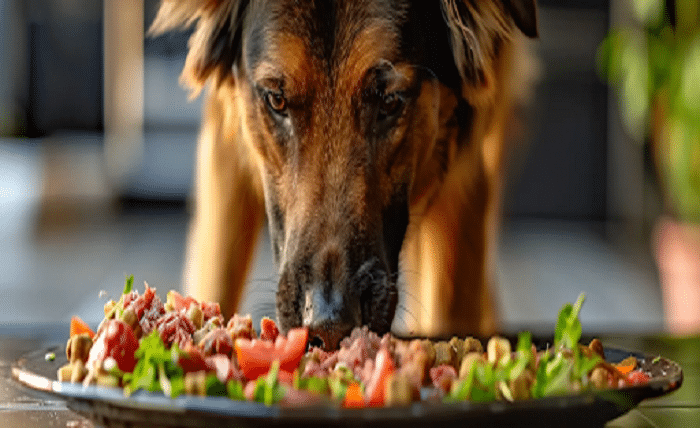The Benefits of a Raw Food Diet for Dogs

Welcome to the evolving world of canine nutrition where the focus is shifting towards more natural and ancestral diets. Among the various feeding regimes, the raw food diet, often known as BARF (Biologically Appropriate Raw Food), is gaining momentum among dog owners. Many believe it brings dogs closer to the diet they evolved to eat. But what are the real benefits, and how does it stack up against traditional kibble? Below, we delve into the significant advantages and considerations of a raw food diet for dogs.
Understanding the Raw Food Diet for Dogs: A Comprehensive Overview
The raw food diet for dogs involves feeding them uncooked meat, organs, bones, and sometimes raw eggs, vegetables, fruits, and supplements. Advocates, like Dr Martys, believe this diet is more natural, mimicking what canines ate before domestication and avoiding preservatives and artificial ingredients found in commercial pet foods.
Switching a dog to a raw diet requires thorough understanding and careful planning to ensure balanced nutrition. Consulting with veterinarians or canine nutritionists is crucial. Owners should transition their pets gradually, adjusting the diet based on the dog’s reactions to minimize digestive upsets. Advocates report benefits like improved coat condition and overall well-being.
Exploring the Nutritional Advantages of Raw Food for Canine Well-being
Raw food enthusiasts argue that it offers improved nutrition due to the preservation of vitamins and enzymes. They believe that raw-fed dogs benefit from a more diverse range of amino acids and fats, as well as bones, which are essential for maintaining skeletal health and dental hygiene. The diet also includes finely ground vegetables and fruits, which provide antioxidants and phytonutrients that support immune function.
The benefits of raw food diets are only realized when the diet is well-balanced, requiring professional input and careful meal planning. Raw food is rich in fats and proteins, which are crucial for energy levels and cellular structure. Chewing bones can also improve dental hygiene, potentially reducing dental problems in domestic dogs.
Impact of Raw Food on a Dog’s Digestive Health
Dogs’ digestive systems are robust enough to handle bacteria found in raw meats, and proponents of raw feeding argue that this natural diet enhances digestive efficiency. The absence of processed grains and fillers reduces the load on the digestive system, making it easier for dogs to assimilate nutrients. Better digestion results in smaller, firmer stools, as raw food is more bioavailable, reducing waste and utilizing most nutrients.
Probiotics and enzymes, essential for healthy gut function, are preserved in raw food, which can help boost a dog’s gastrointestinal health. A shift to raw food may cause temporary digestive upset, so continuous monitoring during the transition phase is crucial to ensure dogs receive the benefits without significant discomfort or health risks.
The Role of Raw Diets in Enhancing Your Dog’s Energy and Vitality

Raw food has been found to increase energy and vitality in dogs due to its high protein content, which is essential for muscle development and repair. Unprocessed fats in raw diets provide a more natural energy source, potentially boosting stamina and performance.
The diet also has a positive impact on a dog’s mental well-being, as chewing on raw bones can be mentally stimulating and satisfying, reducing boredom and potentially leading to a calmer disposition. The freshness and variety in raw diets can enhance a dog’s eating experience, particularly for picky eaters or those with decreased appetite due to age or illness. Raw food offers a healthier and more satisfying option for dogs.
Addressing Safety Concerns: How to Properly Implement a Raw Food Diet
Raw food feeding for dogs is a safe and healthy option, but it comes with risks such as potential exposure to pathogenic bacteria, parasites, and nutritional imbalances. Proper handling, preparation, and storage are crucial to minimize these risks. Consultation with a veterinarian or pet nutritionist is recommended when starting a raw food regimen. High-quality ingredients from reputable suppliers are essential, and freezing meat can help kill parasites and reduce bacterial load.
A balanced diet is also crucial, with varied meals and supplements to fill gaps. Regular vet check-ups and blood tests are essential to ensure the dog’s health and prevent diet-related issues. Transitioning slowly and observing the dog’s response can help identify problems early on.
Overall, the raw food diet offers potential benefits for dogs, including improved nutrition and vitality, but also requires owners to ensure safety and meal preparation. When implemented carefully and under professional advice, it can enhance health for many dogs, reflecting the deep bond between owners and their pets.




